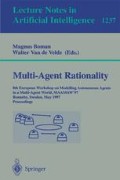Abstract
A framework for coordination in multi-agent systems is introduced. The main idea of our framework is that an agent with knowledge about the desired behavior in a certain domain will direct other, domain-independent agents by means of signals which reflect its evaluation of the coordination between its own actions and their actions. Mechanisms for coordination are required to enable construction of open multi-agent systems. The goal of this investigation was to test the feasibility of guiding an agent with coordination evaluation signals, and furthermore to gather experience with instantiating the framework on a testbed domain, the Pursuit Problem. In the testbed system, agents have been created which choose their actions by maximizing the coordination evaluation signals they will receive. The performance of these agents turned out to rank among the best results encountered in literature, and behavior guided by coordination evaluation signals can thus be concluded to be useful in this domain.
Preview
Unable to display preview. Download preview PDF.
References
Benda, M., Jagannathan, V., and Dodhiawalla, R. (1988). On optimal cooperation of knowledge sources. Technical Report BCS-G2010-28, Boeing AI Center.
Brazdil, P., Gams, M., Sian, S., Torgo, L., and Van de Velde, W. (1991). Learning in distributed systems and multi-agent environments. In Kodratoff, Y., editor, Machine learning — EWSL-91, Lecture Notes in Artificial Intelligence, vol. 482, Berlin. Springer Verlag.
De Jong, E. (1997). Ai-memo 97-05. Technical report, Vrije Universiteit Brussel, AI Lab.
Genesereth, M. R., Ginsberg, M. L., and Rosenschein., J. S. (1986). Cooperation without communication. In Proceedings of the National Conference on Artificial Intelligence, Philadelphia, Pennsylvania. AAAI-86.
Korf, R. E. (1992). A simple solution to pursuit games. In Working Papers of the 11th International Workshop on Distributed Artificial Intelligence.
Kraus, S. and Rosenschein, J. (1992). The role of representation in interaction: Discovering focal points among alternative solutions. Decentralized Artificial Intelligence III.
Levy, R. and Rosenschein, J. (1992). A game theoretic approach to distributed artificial intelligence and the pursuit problem. Decentralized Artificial Intelligence III.
M. Fenster, S. K. and Rosenschein, J. (1995). Coordination without communication: Experimental validation of focal point techniques. In ICMAS '95.
Maturana, H. and Varela, F. (1992). The Tree of Knowledge: The biological roots of human understanding. Shambala, Boston and London.
Minsky, M. (1985). The Society of Mind. Simon & Schuster, London.
Rumbaugh, J., Blaha, M., Premerlani, W., Eddy, F., and Lorensen, W. (1991). Object-Oriented Modeling and Design. Prentice-Hall International, Inc.
Sandip Sen, M. S. and Hale, J. (1994). Learning to coordinate without sharing information. In Proceedings of the National Conference on Artificial Intelligence, pages 426–431, Seattle, Washington.
Sen, S. and Sekaran, M. (1995). Multiagent coordination with learning classifier systems. In G. Weiss, S. S., editor, Adaption and Learning in multiagent systems, pages 218–233, Berlin, Heidelberg. Springer Verlag.
Stephens, L. M. and Merx, M. B. (1990). The effect of agent control strategy on the performance of a dai pursuit problem. In Proceedings of the 1990 Distributed AI Workshop.
Van de Velde, W. (1996). Cognitive architectures — from knowledge level to structural coupling. In Steels, L., editor, The Biology and Technology of Intelligent Autonomous Agents, pages 197–221.
Author information
Authors and Affiliations
Editor information
Rights and permissions
Copyright information
© 1997 Springer-Verlag Berlin Heidelberg
About this paper
Cite this paper
de Jong, E. (1997). Multi-agent coordination by communication of evaluations. In: Boman, M., Van de Velde, W. (eds) Multi-Agent Rationality. MAAMAW 1997. Lecture Notes in Computer Science, vol 1237. Springer, Berlin, Heidelberg. https://doi.org/10.1007/3-540-63077-5_26
Download citation
DOI: https://doi.org/10.1007/3-540-63077-5_26
Published:
Publisher Name: Springer, Berlin, Heidelberg
Print ISBN: 978-3-540-63077-7
Online ISBN: 978-3-540-69125-9
eBook Packages: Springer Book Archive

